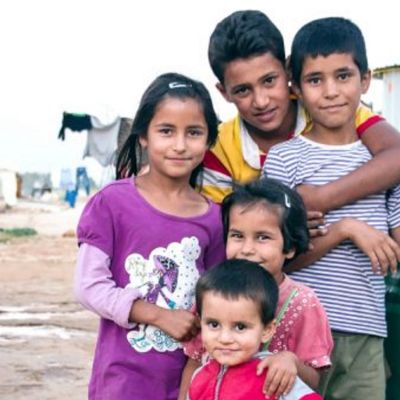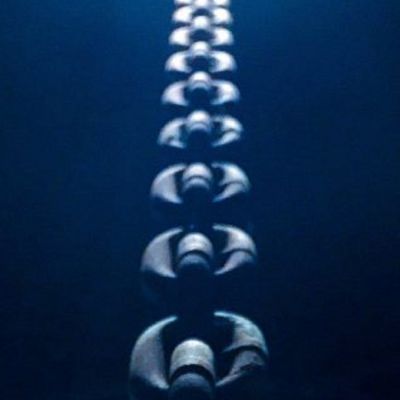Written by: Edward Lai (Senior Communications Officer)
The Syrian War has already been 8 years and it is still far from over. Chronic warfare resulted in uncountable casualties and destruction. More than 11 millions of civilians lost their homes, and were either displaced within the country or have fled to countries in the Middle East and North Africa to seek asylum, such as Lebanon, Turkey, and Jordan [1]. When their homelands are still devastated by conflicts, rebuilding their country seems impossible. How do these refugees live in neighbouring countries? Why are their children and other Middle Eastern and North African children described as the “lost generation”? While facing multifaceted challenges, how does this younger generation bear hope for the future? Kurt Johansen, executive director of SAT-7 Europe, Asia and Pacific, a partner of CEDAR, answered our questions one by one.
More than a Humanitarian Crisis
According to the United Nations, 40% of schools in Syria were damaged or used for military purpose [2]. With millions of Syrian children having fled to neighboring countries, over 800 thousand of them do not have a chance to go to school [3]. They are vulnerable to being recruited as child labourers, or deceived to be child soldiers, or used as sex slaves. SAT-7 perceived that the Syrian Crisis had already been transited from a humanitarian crisis to a development issue. This involved development opportunity of children and youths, and is relevant to the long-term peace development in the area.
SAT-7 is a 24/7 Christian satellite television network broadcasting in Arabic, Turkish and Persian across the Middle East and North Africa. SAT-7 had seen the above development needs of children and youths, and hence, launched “SAT-7 Academy” in September 2017 [4], providing educational programmes in various aspects, namely subject learning, personal health, community development, and social affairs. At present, residents in the Middle East and North Africa still mainly rely on satellite TV to receive information.
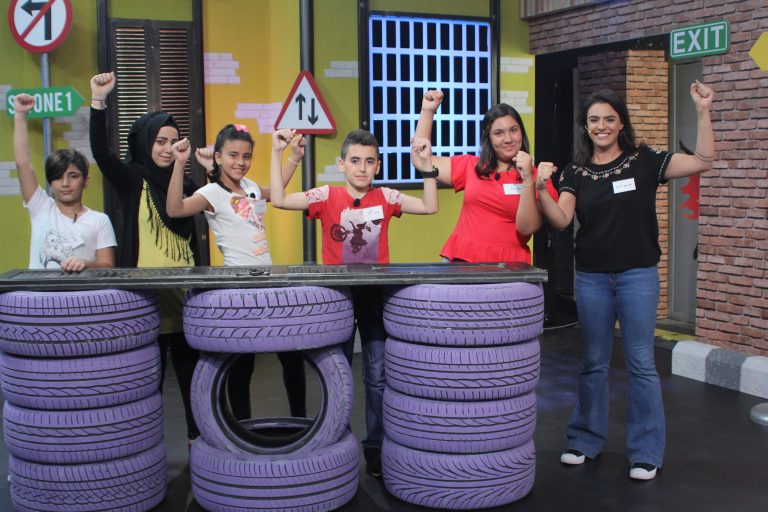
Johansen said, “They (refugee children) have no schools to go, but there is a ‘school’ on their TVs. I once visited a refugee camp in Lebanon, and I could not find one tent without a satellite dish. They can spend a whole day in front of the TV and therefore they can obtain schooling somewhat similar to school.” SAT-7 believes that if children are not educated and do not learn values like inclusion and love, others will teach them opposite values, which can be seen from the prevailing propaganda on extremism in the Middle East and North Africa nowadays.
Against the Hatred Messages
“Many local propaganda and media are spreading messages of hatred and revenge for honour. Thus, we believe that we do not only talk about hard facts (on our educational programmes), but also teach them how to live their lives, think critically and be an open-minded person.” Johansen added, “Many young people do not have access to education, nor they have jobs opportunities and social welfare entitlement. If ISIS promises to give them US$50 a month to fight for them, they will probably go with them.”
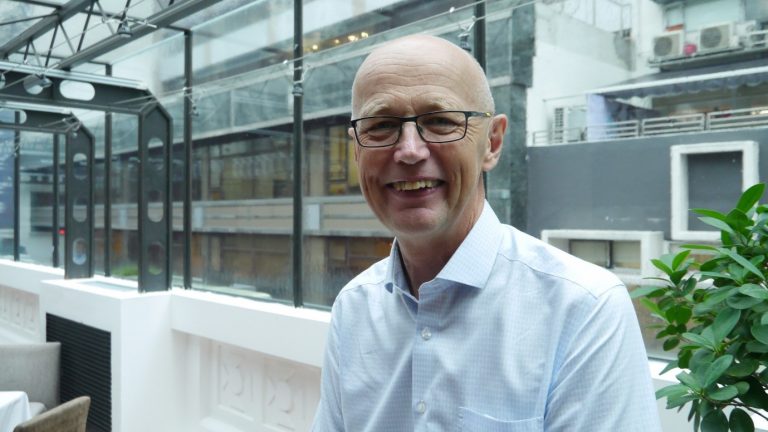
These children lost in neighbouring countries have their normal childhood seized. The UN describes them as the “lost generation”. Collaborative assistance from different sectors are desperately needed. Otherwise, they would easily be radicalised and become tools of extremists. SAT-7 understands this logic very well, and thus, they actively spread messages of forgiveness, care, and grace.
A few years ago, SAT-7 produced a video clip that went viral and gained hundreds of thousands of views. The video was about a 9-year-old Iraqi girl, Myriam, who chose to forgive ISIS that made her and her family displaced from home. She said, “I will not kill them. Why should I kill them? I am just very sad. They drove us out from our home. Why did they do this?” She continued, “I will not do anything to them. I will only ask God to forgive them.”
By the end of video shooting, SAT-7’s team thanked her for teaching them many things. But she said, ‘I want to thank you for giving me a voice. I have nothing else to give.’ After that, SAT-7 invited her to sing them a song. She sang about Christ’s salvation on her with her silvery voice. Myriam’s story was exactly the message SAT-7 yearned to spread.
The programmes of “SAT-7 Academy” not only respond to refugee children’s learning needs, but also help parents understand more about their children’s situation. Johansen said, “In some areas of the Middle East and North Africa, parents do not want to invest in their daughters’ education, but to hope their daughters to get married the soonest the possible, to avoid them from being raped. In view of this, “SAT-7 Academy” motivates the parents in our programmes that they should send their children to schools and understand the world.” Moreover, experiences of flight and persecution left a permanent mark in children’s hearts. “SAT-7 Academy” explained about trauma in their programmes to teach parents how to understand their children. At the same time, they let children know how to express their inner feelings through drawing and singing.
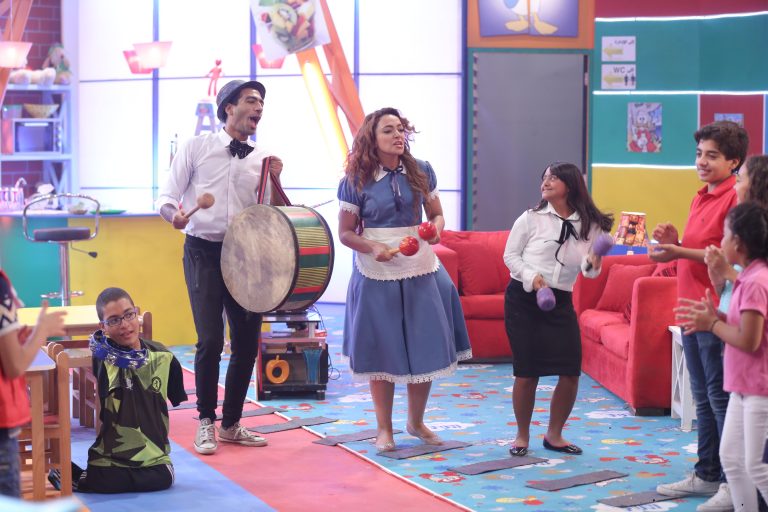
According to the most recent survey, over 650 thousand people are watching “SAT-7 Academy” programmes every day, of which 500 thousand watchers are children. “SAT-7 Academy” utilises various platforms of social media, such as YouTube, Facebook and Instagram, to spread their messages. CEDAR invites Hong Kong Christians to pray for children in the Middle East and North Africa, so that they would remain hopeful and resilient despite challenges everywhere.
(Photos of cover page and feature story are provided by “SAT-7 Academy”)
Notes:
[1] https://reliefweb.int/report/syrian-arab-republic/syrian-refugee-crisis-what-you-need-know-and-how-help
[2] https://reliefweb.int/report/syrian-arab-republic/no-school-go-back-impact-airstrikes-syrias-schools
[3] https://www.unicef.org/mena/reports/syria-crisis-fast-facts
[4] CEDAR Fund has been supporting partner SAT-7 to set up SAT-7 ACADEMY since 2017. We have written about the programme called City of Films before. The programme is produced by a group of Egyptian children and youth aged 8 years old or above. Read more
Content of this issue
Written by: Edward Lai (Senior Communications Officer) The Syrian War has already been 8 years and it is still far from over. Chronic warfare resulted in uncountable casualties and destruction. More than 11 millions of civilians lost their homes, and were either displaced within the country or have fled to countries in the Middle East and North Africa to seek asylum, such as Lebanon, Turkey, and Jordan [1]. When their homelands are still devastated by conflicts, rebuilding their country seems impossible. How do these refugees live in neighbouring countries? Why are their children and other Middle Eastern and North African children described as the “lost generation”? While facing multifaceted challenges, how does this younger generation bear hope for…
Written by: Professor Ip Hon Ho Alex (Assistant Professor, Divinity School of Chung Chi College, The Chinese University of Hong Kong) The economy of the Roman Empire was founded upon oppression and exploitation. In the early period, one third of the Empire’s population were slaves; while another third were freed slaves. There were also many people who owned no land and served no masters. These people were often employed as casual workers or day labourers. To put it simply, the relatively high economic growth during the early period of the Roman Empire was a result of exploiting manual labourers who did not have much power to fight for their own interests. However, structural evil did not arise from…



